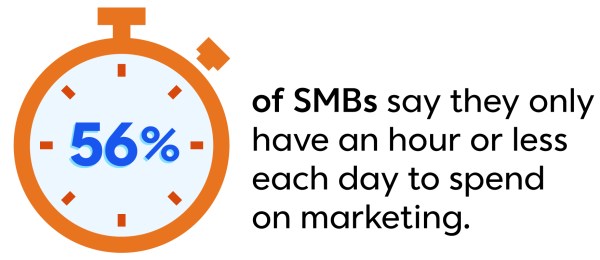
There are hundreds of millions of small businesses around the globe, and they all have one thing in common: they need to market themselves to customers. Without marketing, customers wouldn’t know the business exists, nor would business owners have any way to stay in touch with their patrons.
As it turns out, SMBs also face another common predicament — increasing pressure to do more with less. In the complex realm of digital marketing, that means sending more messages, generating more sales, showing up in more places and taking on more responsibilities, all without any additional time, training or budget.
Sound familiar? It’s a reality that’s become all too familiar for SMBs around the world.
We’re passionate about helping small businesses succeed. That’s why we’re constantly digging into the latest trends to stay ahead of the curve. Our newest research study, Small Business Now: The State of SMB Marketing, explores the biggest barriers preventing small businesses from marketing effectively, and how they can overcome those obstacles to get closer to their customers.
Here’s what we learned after surveying 1,300 businesses across Australia, Canada, the UK and the U.S.:
Pulse Check: Overall SMB confidence is lower than expected, especially as it relates to marketing.
- A staggering 81% of SMBs are concerned that a stubbornly hot global economy could negatively impact their business this year. This is a notable departure from the optimism we observed throughout most of 2023.
- Small businesses in the UK report the highest level of concern about the economy compared to other countries polled.
- 73% of small businesses worldwide aren’t sure their current marketing strategy is working. Confidence levels are lowest among solopreneurs and other SMBs that are less than three years old.
- 44% of SMBs globally intend to spend more time on marketing this year, and 39% expect they’ll need to increase marketing budgets as well.
It’s clear that the economy is a bigger concern today than it was in 2023, and overall marketing confidence is low. In the face of that uncertainty, many SMBs expect to spend more time and resources on marketing this year to stay top-of-mind with their customers.
If this sounds like you, a quick word of caution. Simply cranking up the dials across the board is unlikely to improve your campaign results. Instead, identify the holes in your current strategy and focus on using the right marketing tactics that’ll generate results.

Often, the first step to accomplishing this is by evaluating and choosing the right marketing channels rather than placing all of your proverbial eggs into one basket. This can help SMBs to diversify the audience they are reaching, ensuring a flow of new interest while still building relationships with established customers, donors, and supporters. By pairing owned channels (like email, events, and SMS text messaging) with other opportunities like social media and online advertising, SMBs can confidently create a stronger marketing foundation.
Out of Time: There aren’t enough hours for small businesses to prioritize marketing.
- 56% of SMBs globally say they only have an hour or less each day to spend on marketing, and 34% feel working more efficiently is the key to achieving their goals in 2024.
- Notably, small businesses in Canada report the least time available for marketing of any country we polled.
- 52% of SMBs globally routinely put off marketing in favor of other activities, with Australian SMBs the most likely to procrastinate. Comparatively, their counterparts in the U.S. are least likely to put off marketing tasks.
- The most time-consuming marketing tasks are posting on social media, planning and strategy, and determining what’s working. Those are also the areas small businesses are most likely to push off for later.
Small businesses wear a lot of hats, so it’s not surprising that marketing takes a backseat to other responsibilities. But, what’s surprising is exactly how little time for marketing most SMBs have, and how frequently they put it off for later.

And, that lack of confidence? It has a direct impact on time spent on marketing. Small businesses with low confidence in their marketing strategies are 1.5 times more likely to procrastinate or skip marketing altogether.
The good news is that if you’re struggling to fit marketing into your day, there are tools to help you be successful. Constant Contact’s automation technology and content generation tools help SMBs work faster, send more messages and get more done without requiring any more of your precious time or resources. That means less time spent on marketing, but better results — so you can focus on what you do best.
In fact, our last Small Business Now Report uncovered the fact that 33% of small businesses were saving more than 40 minutes a week on marketing by using artificial intelligence and automation, specifically in the areas of social media, content creation, and email marketing – the very spots where marketers are now struggling the most.
Knowledge Gaps: The wrong channel mix and a lack of strategy are preventing SMBs from growing.
- 60% of SMBs say finding new customers is their top marketing challenge, followed by understanding what’s working (33%) and lack of resources (32%).
- 37% of SMBs globally said choosing the right channels is the biggest area of marketing where they need to improve, and 41% want to increase the number of channels they use in 2024.
- 82% of SMBs agree that using multiple marketing channels leads to better results, but just 16% are very confident that they are using the correct channels to reach their customers.
- Social media is the most popular marketing channel for SMBs (60%), followed by email marketing (53%).

Small businesses need to acquire customers to grow and thrive, but with over 80% of SMBs expressing concern about the economy, the pressure to choose the right channels and tactics that yield results is immense. It’s especially difficult if they don’t understand which channels to leverage or how to improve their campaigns.
Again, does this sound familiar? If you’ve ever found yourself scratching your head, wondering where and when to connect with your target audience, or how your marketing strategy is getting you closer to your goals, then you’re not alone.
Your business is important to you. So important, that you spend hours thinking about how to reach more people, build relationships, and grow your business. With Constant Contact, you can take a deep breath and leave the thinking to us. We’ll use cutting-edge technology to help you reach the right people at the right time with the right message. Banish writer’s block with content generation, drive sales or events and maximize the impact of your campaigns.
In conclusion
Small businesses are feeling the squeeze from all sides, grappling with economic worries and a lack of confidence in their marketing strategies. Many are preparing to invest more time and resources, but more isn’t always better. What’s crucial is investing wisely by focusing on strategies that actually deliver.
This is exactly where Constant Contact shines. We understand that running a small business is no small feat, especially when it comes to marketing. Our platform is designed to take the stress out of marketing so you can stop guessing about what your customers want, and where they are most likely to interact with you, and get back to running your business. Whether you’re struggling to find the time, unsure about your strategy, or feeling overwhelmed by the need to market your business, Constant Contact delivers.
So, if you’re spending sleepless nights wondering how to connect with your audience, or how to turn likes into sales, let us help you. With Constant Contact, you get more than just a service provider; you get a partner who’s as committed to your business’ success as you are.
Interested in taking a deeper dive into the results? Download the full report, or see our previous reports on the Constant Contact Data Hub.
Report Methodology
Constant Contact’s Small Business Now report analyzes insights from over 1,300 small business decision-makers at the Director level and above at companies with under 250 employees. Polls were conducted in Australia, Canada, the United Kingdom and the United States and aggregated to determine global trends. All stats are representative of their associated demographics. The survey was conducted by Ascend2 in February 2024.





